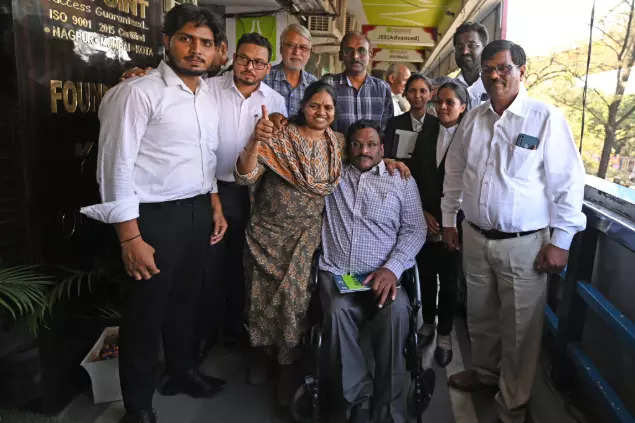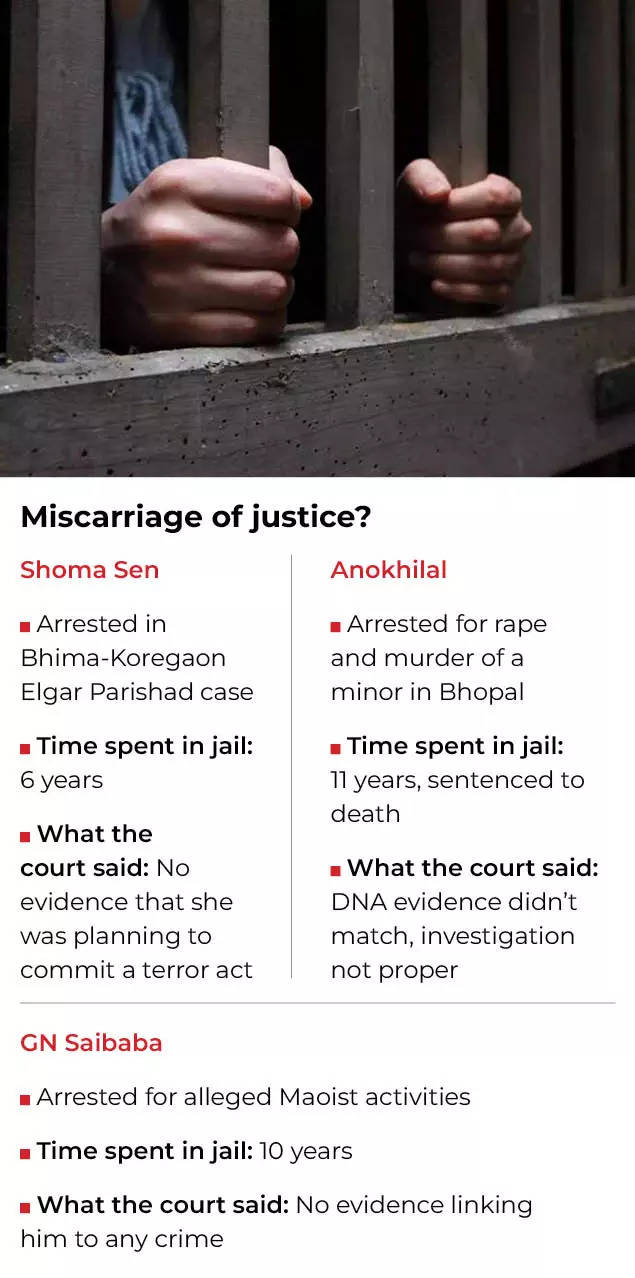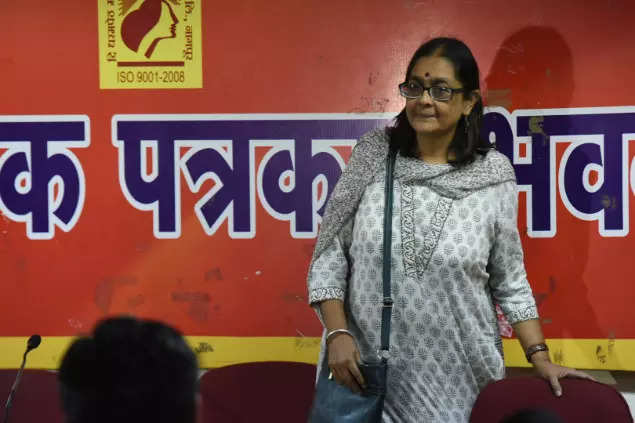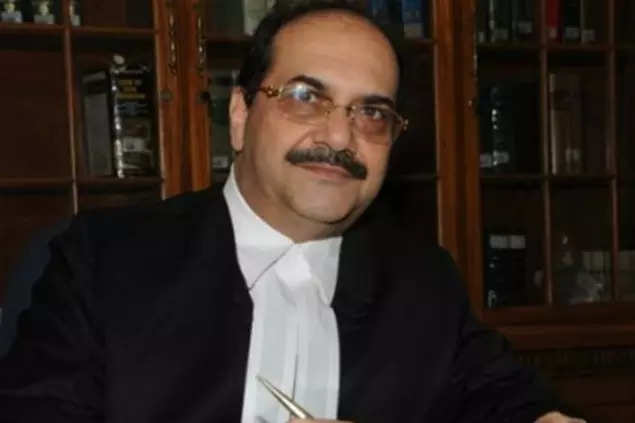What connects three professors — from Delhi, Kolhapur and Nagpur — to 17 residents of a village in Madhya Pradesh? All of them spent time in jail as undertrials or convicts before they were either acquitted or granted bail due to lack of evidence, with the courts questioning the cases against them.
Take the case of former Delhi University professor GN Saibaba. Acquitted by the Bombay high court in March, Saibaba was convicted for Maoist activities under the Unlawful Activities (Prevention) Act (UAPA) and spent nearly 10 years behind bars as an undertrial and a convict.
In its judgment, the high court observed that the prosecution has failed to link accused like Saibaba to any crime.
“In fact, there is no evidence brought forth by the prosecution to connect the persons (Saibaba and other accused) with any actual act of terrorism which had taken place in the past or to demonstrate how the persons were directly connected with and responsible for the commission of any other act of terrorism,” the court observed.
After his release, Saibaba — who is disabled — said that he had developed severe medical conditions in prison, including a heart ailment. The former professor was even denied permission to attend his mother’s funeral. “The prison department and government robbed me of fulfilling my mother’s wishes in her final days,” he said.
Watch: Former Delhi University professor acquitted medium nocaptionhttps://youtu.be/jjJOV4D1qxw?si=vq7wIIUguTV2rEhh
Former Nagpur University professor Shoma Sen was in jail for six years after being arrested in the Bhima-Koregaon Elgar Parishad case. On April 5, the Supreme Court granted bail to the 66-year-old and said the restrictions on bail under the UAPA did not apply to her.
The court noted it did not find “prima facie any commission or attempt to commit any terrorist act” by Sen.
There are many other cases, not always in serious offences, where people spend years behind bars waiting to be exonerated. The term used to describe cases where a person is arrested, jailed and denied bail for extended periods of time falls under what can be categorised as “miscarriage of justice”.
Experts as well as a Law Commission report point to this problem being very prevalent in the Indian criminal justice system. And the price for this is almost entirely borne by the person accused. You could lose time with your near and dear ones, you could find your career and plans crushed and you could emerge with health problems you never had before you went to an overcrowded prison.
In countries like the US, UK, those who face wrongful prosecution are eligible to file claims for compensation, which are then evaluated. In India, courts have pointed to lack of evidence and even malicious or politically-motivated prosecutions. But those who suffer the legal process don’t even get an apology, much less any compensation.
How bad is the situation?
According to National Crime Records Bureau data from all states for 2022, close to 75% of those in India’s 1,330 jails are undertrials.
Of the 4.34 lakh undertrials in Indian prisons, almost half are aged between 18 and 30 years, their most productive years economically.
A total of 3.26 lakh inmates are facing cases filed under Indian Penal Code (IPC) offences, and it’s under this law that the highest number of convictions take place. The 2022 data indicates that the overall conviction rate for offences under the IPC is about 35%.
If this conviction rate hasn’t risen significantly, it indicates that nearly 65% of the undertrials in IPC-linked offences could be undergoing jail terms wrongly. That amounts to nearly 2 lakh people.
Take the case of the 17 people arrested from Mohad in Madhya Pradesh’s Burhanpur district in 2017. Their alleged crime was celebrating Pakistan’s victory in the ICC Champions Trophy final against India. Two of those arrested were minors.
They were initially accused of criminal conspiracy and promoting enmity. During some court hearings, slogans like “Desh ke gaddaron ko, goli maro salon ko” (shoot the traitors of the nation) and “Atankwadiyon ko phansi do” (hang the terrorists) were shouted at them.
According to reports, they were in jail for more than six years as undertrials. All of them were acquitted by a district court.
“After going through all the evidence, arguments and eyewitnesses, there was no proof that the accused raised slogans and burnt firecrackers,” the trial court’s judgment said.

In the case of Kashmiri professor Javed Ahmed Hajam, who was teaching at a college in Maharashtra’s Kolhapur district, his alleged crime was posting two WhatsApp statuses in August 2022 that got him charged with promoting enmity.
On August 5, his WhatsApp status said ‘Black Day Jammu & Kashmir’ to mark the abrogation of the state’s special status. On August 14, his WhatsApp status read: ‘Happy Independence Day Pakistan’.
Hajam spent about a month behind bars and then fought a legal battle for nearly two years before the case was quashed by the Supreme Court. The court said everyone had a “right to be critical of the action of abrogation of Article 370 and the change of status of Jammu and Kashmir”.
“If every criticism or protest of the actions of the State is to be held as an offence under Section 153-A, democracy, which is an essential feature of the Constitution of India, will not survive,” the court observed.
The court also made an observation about the need to educate the police machinery on the fundamental right to freedom of speech and expression.
In all these cases, neither the police nor the prosecution that represents the State have had to introspect on these cases and whether the accused persons needed to spend as much time in jail as they finally did.
Worse under special laws
Under the stringent UAPA — where getting bail is even harder than other criminal cases — more than 24,000 people were accused in 5,027 cases registered between 2016 and 2020.
The data revealed in response to a question in the Rajya Sabha showed that just 212 people had been convicted in these cases, and 386 were acquitted. As per the data, nearly 98% of those arrested under the law had been imprisoned for multiple years just awaiting trial or to get bail.
Justice (retd) Abhay Thipsay — who was in the Allahabad and Bombay high courts — said that in many cases undertrials were not being granted bail and judges were shirking bail applications.
Justice Thipsay pointed to an order by a two-judge bench of the Supreme Court on February 16 where it observed that the Bombay high court had been “shunting” bail applications instead of ruling on the merits of the case.

“Not deciding the matter pertaining to liberty of a citizen expeditiously and shunting away the matter on one or the other ground would deprive the party of their precious right guaranteed under Article 21 of the Constitution of India,” the bench observed.
Senior Supreme Court advocate Colin Gonsalves said that the apex court was equally responsible for the current state of affairs when it came to curtailing pretrial liberty. Recent orders by the apex court refusing bail were adding to the problem, he said.
Referring to the incarceration of the 15 accused in the Bhima-Koregaon Elgar Parishad case, Gonsalves said there is no evidence of any violence in the case. Even in the case of the six accused who have received bail, they spent four to five years in jail as undertrials. One of them — priest Stan Swamy — died in custody in 2021.
“It takes five years for the court’s conscience to be pricked and find that there is no violence, while they should have checked that on day one itself, when the accused were arrested and produced for remand,” Gonsalves said.
How to curb wrongful prosecutions?
“There is no doubt that there should be a process and it can emanate from the trial court’s judgment,” said Amit Desai, a senior Bombay high court advocate.
According to Desai, the trial court is the best place to decide who can be held liable or responsible in a case where a person has been wrongly persecuted by an investigating agency or the prosecution.
However, he says some changes can be made to laws. Desai said an accused person should have their rights enhanced just like the victims’ in the Criminal Procedure Code.
“Balancing the rights of the victim and the accused is absolutely necessary,” he said.

Sanjay Hegde, a senior advocate who mostly practises in the Supreme Court, also feels there should be a law to allow courts to rule on cases where the rights of the accused are completely ignored or violated during their prosecution.
“There should be legislation which defines these things so that the trial courts feel empowered to make such observations or pass relevant orders,” said Hegde.
The senior lawyer said cases where a person is acquitted for reasons other than wrongful prosecution shouldn’t be considered.
When the police arrest someone because of pressure to claim the case was solved — or due to political pressure — the malice would reflect in the investigation, he said. He said that the punishment for the investigating officers and compensation for the accused should be “deterrent enough” for the State to take note.
“The compensation should be deterrent enough so that it pinches the State,” he said.
How much should one be compensated?
Gonsalves referred to Saibaba’s case to question how much compensation should be given.
“Why shouldn’t he be compensated with ₹1 crore for every year lost, or why not ₹10 crore every year?” asked Gonsalves.
Justice Thipsay — who has been a magistrate, sessions judge and special MCOCA (Maharashtra Control of Organised Crime Act) judge — said a high-level committee should be constituted to study all cases where a trial court has made serious observations about the prosecution.
It should then pass orders for compensation for the accused as well as action against the police officers.
He added that the recommendations of this committee should be made binding for it to show real impact because as it stands most trial court observations are presently ignored.

Justice Thipsay said in one case he acquitted three persons charged under the stringent MCOCA law and there was clear evidence of fabrication of evidence against the police team.
“I had noted down everything in detail in my judgment and had directed that it be placed before the advocate general for action against the policemen. However, nothing was done,” he said.
Justice Thipsay said in another case he had acquitted a sessions court judge of alleged connections with the underworld.
“Even in that case, it was very clear that the evidence was fabricated. The duration of the recorded conversation played in the court allegedly between the accused judge with the underworld element was longer by a minute as compared to the call duration reflected in the call records. How is that possible?” Justice Thipsay asked.
“Nothing happened to the police officers in that case either,” he said.
Recommendations ignored
Various suggestions about a special law and system to compensate victims did feature in a report submitted by the Law Commission in August 2018. However, all its suggestions seem to have been overlooked completely by the government while formulating the new criminal laws.
The commission said the creation of a new redressal system was “of utmost importance because of the social stigma and other such disadvantages attached to a prosecution and conviction (notwithstanding that it was wrongful in the first place)”.
The commission, headed by former Supreme Court judge Justice BS Chauhan, recommended…
- a law to compensate victims of miscarriage of justice
- special courts in every district that would decide cases quickly
Anyone acquitted by a court in a case should be able to file a claim, the report said. These special courts could have the power to direct the authorities to initiate proceedings against erring officials.
The commission suggested an interim compensation between ₹25,000 and ₹50,000 in cases where a person spent more than six months in jail. It said the final compensation should be decided on the basis of all the losses caused to the petitioner — including loss of property, health, opportunities and family life.
The report said the court should also provide petitioners with “non-pecuniary assistance” for the rehabilitation of victims.
However, Justice Thipsay said the biggest challenge to addressing wrongful prosecutions is that society doesn’t feel very strongly about the issue.
“People simply feel that if someone was wrongly prosecuted, he or she was eventually acquitted or discharged. So, that is enough,” he said.
“There is no outrage, therefore the system feels that there is no need to do anything more,” he said.
Advocate Hegde also said that even those with a case have little desire for a legal battle.
“Most people who have been acquitted want to have nothing to do with the court process anymore. They are just glad to be free and move on with their life,” he said.
Lead image: Sajeev Kumarapuram/AI
